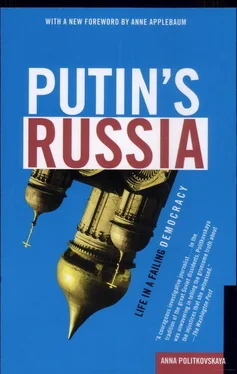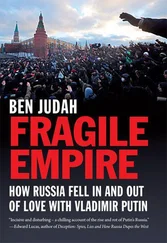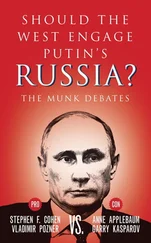In Vladikavkaz, the traditional setting for many fabricated court cases against international terrorists, the local lawyers act less as counsels for the defense than as functionaries in close liaison with the court, the FSB, and the prosecutor’s office. Vladikavkaz is also where agents of the Chechen directorate of the FSB often have extended tours of duty, preferring to bring their victims there to interrogate them, as far away from the war as possible.
Cherepnev now went to Hasuhanov in Vladikavkaz and found him a lawyer. Since June 1, 2003, Russia has had a progressive code of criminal procedure in conformity with the highest European standards. Among other things, it prohibits interrogating a suspect without a lawyer being present, but of course, “when necessary,” everything continues as before. In any case, from April 20 until October 9, 2002, for almost six months, Hasuhanov had no legal representation at all. Not until his skull had healed over and his fractured ribs and broken hands had recovered at the timber mill could he be readied for a court appearance.
Here again, the details are of interest. On October 8, Cherepnev summoned Hasuhanov to an interrogation and instructed him to address an application to him. Cherepnev dictated the following: “I request you to provide me with a lawyer for the preliminary investigation. Up to the present time, I have had no need of the services of a lawyer, and in this connection I have no complaints against the investigative services. I request you to appoint an advocate chosen at the investigator’s discretion….” On October 9, then, Hasuhanov had his first interrogation in the presence of a Vladikavkaz legal-aid attorney. Hasuhanov suspected the attorney was an FSB agent. [4] The Russian code of criminal procedure provides that the accused have access to an attorney irrespective of ability to pay. During the second Chechen war, however, the law-enforcement agencies began misusing the system to foist on accused persons defense lawyers who, more often than not, were the agencies’ former employees. Such people are known as insider lawyers. There are also lawyers who work with the FSB and so have a better understanding of its needs than of the individuals they are supposed to be defending. The function of such lawyers is to be present on occasions when the law requires the presence of an attorney. FSB officers also appoint insider lawyers to represent suspects the FSB has abducted. The relatives know only that their family member has disappeared. The FSB deliberately hides him, informing the family neither of his whereabouts nor of the charges against him. Often no formal accusation is ever made. The detention of the disappeared person is illegal, but the family is prevented from appointing a defense lawyer for him. Such victims can “disappear” for weeks or months; in Hasuhanov’s case, the period was about six months. Meanwhile, testimony is beaten out of them, as happened in Hasuhanov’s case. His family had no idea what had happened to him or where he was. All the law-enforcement and security agencies of the republic denied they were detaining anybody by that name, while in fact he was being tortured by the FSB despite the appointment of a lawyer.
The lawyer did nothing to cause him to change his mind. He gave Hasuhanov no advice, sat passively at the interrogations, and said nothing.
From the court record:
“You may say whether there is a difference between the evidence you gave before a lawyer was present and after, and if so, what that difference is.”
“There is a difference. Before, I was not given the record to read at the end of an interrogation. After the appearance of a lawyer, I was.”
In all, Hasuhanov had three such interrogations in the presence of a defense lawyer, on October 9, 23, and 24, 2002. More precisely, in the course of these three days, Cherepnev simply copied the testimony beaten out of the defendant in Znamenskaya onto new forms, which became “testimony in accordance with the code of criminal procedure.”
Cherepnev declared that October 25 would be the final day of the investigation. He informed Hasuhanov that he would shortly receive the text of the indictment and that he was to sign it as quickly as possible. So that he should have no illusions. Hasuhanov was taken from the solitary-confinement unit for two days, October 29 and 30—naturally, without a lawyer. He did not know where he was being taken. He had a hood put over his head and was led out as if to be executed. “That’s it, the end,” the guards said, cocking their rifles.
His execution was a hoax, designed to frighten him into signing the indictment.
Of course he signed. But he remained unbroken, and at the trial he retracted everything on which the indictment was based. The indictment was nonetheless confirmed by the new prosecutor of Chechnya, Vladimir Kravchenko, and the text migrated, virtually intact, into the verdict of Judge Valerii Dzhioyev.
Here are quotations from both the indictment and the verdict, with my comments. It is easy to see how criminal cases are fabricated, and also that none of the counterfeiters are the least bit worried about being exposed or about the fact that these records will remain as the raw material of history (which, in accordance with Russian tradition, will surely be rewritten in the course of time).
In April 1999, Hasuhanov… voluntarily entered an armed formation not permitted under federal law. Hasuhanov made contact with Hambiev Mahomed, an aide of Maskhadov, who proposed that he provide assistance to Maskhadov using his experience to organize the work of “Military Audit,” an IAF then being created.
After retiring, Hasuhanov had returned home to Grozny. Unique in being a Chechen officer with an academic education, he was invited by Maskhadov to work in the Chechen government, which, in 1999, was the official republican government, financed from Moscow, and Maskhadov was the lawfully elected president of Chechnya, recognized by Moscow. The “Military Audit” that Maskhadov invited Hasuhanov to join was an urgent requirement. The Chechen bureaucracy was shamelessly corrupt, as indeed were the bureaucrats in Moscow, and the republican government needed a knowledgeable person to monitor the flow of military funds, in particular those coming from the Russian Federal Treasury. What kind of IAF is that?
From the court record:
“Did you consider the actions of President Maskhadov to be lawful?” [the prosecution asked].
“Yes. I had no way of knowing that Maskhadov, the government, and security ministries would later be considered illegal. I knew that Maskhadov was the president. He was recognized as such by the Russian leaders. There were meetings with his ministers, financial resources were allocated, so of course I did not know that I was joining an IAF.”
“Was it your job to inspect the finances and general administration of the Ministry of Internal Affairs of the Chechen Republic of Ichkeria?”
“Yes, I reported the results of the audit to Maskhadov in June 1999. I listed everything money had been spent on. I received this information from the Ministry of Internal Affairs of the Russian Federation. All the information was received through official channels. I had no reason to suppose anything was unlawful.”
Hasuhanov’s work before the war did indeed include the inspection of finances and administration as well as the setting up of a system to audit and monitor the financial resources allocated for maintaining the security services of Chechnya: the Ministry of Internal Affairs, the national and presidential guards, and the army’s staff headquarters. In the summer of 1999, Hasuhanov established that considerable sums of money were passing through staff headquarters for the purchase of weaponry and uniforms but that, for example, the rocket launchers the Ministry of Defense was ordering from the Grozny Red Hammer Factory were known to be militarily useless. This was a blatant misappropriation of funds, as was the purchase of uniforms. They were being sewn in the Chechen town of Gudremes at a price of sixty rubles per outfit, but the accompanying documentation stated that they were “made in the Baltic States” at a higher price.
Читать дальше





![Stephan Orth - Behind Putin's Curtain - Friendships and Misadventures Inside Russia [aka Couchsurfing in Russia]](/books/415210/stephan-orth-behind-putin-s-curtain-friendships-a-thumb.webp)






